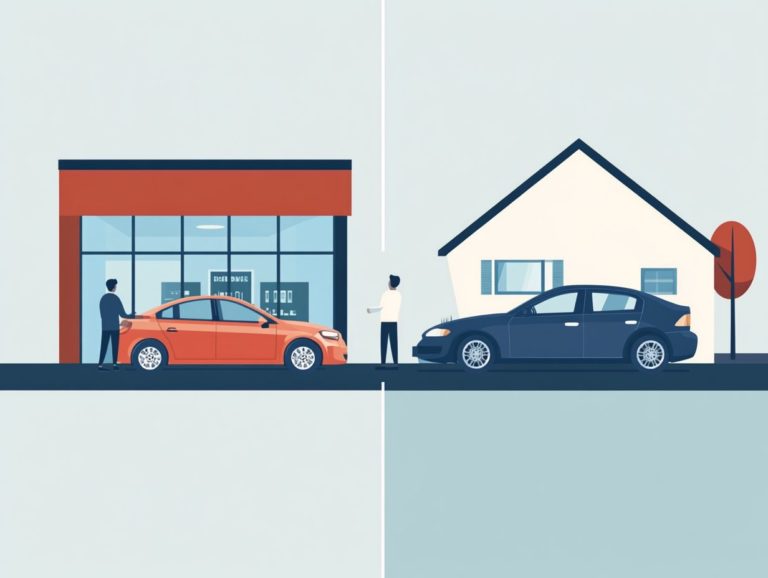How to Choose the Right New Car for You
Choosing the perfect new car may seem daunting, but it doesn t have to be an uphill battle. This guide makes the process simple and stress-free!
This guide simplifies the entire process into clear, manageable steps. It helps you assess your specific transportation needs, establish a realistic budget, and dive into the world of research, comparison, and test-driving potential vehicles.
Additionally, you’ll find strategies for negotiating a fantastic deal and navigating the buying process with ease. Whether you re a first-time buyer or seeking an upgrade, this guide equips you with the insights necessary to make a well-informed decision.
Contents
- Key Takeaways:
- Assessing Your Needs and Budget
- Researching and Comparing Cars
- Test Driving and Inspecting Cars
- Negotiating and Making the Purchase
- Frequently Asked Questions
- What factors should I consider when choosing a new car?
- How do I determine the right size and type of car for my needs?
- What should I look for in terms of safety features?
- How important is fuel efficiency in choosing a new car?
- Should I buy a new or used car?
- What steps should I take before making my final decision on a new car?
Key Takeaways:

- Know your transportation needs. Set a budget before starting your search.
- Use online tools and read reviews to compare cars.
- During test drives, check important features. Be prepared to negotiate for the best price.
Assessing Your Needs and Budget
When you embark on the car buying journey, taking the time to assess your needs and budget is a pivotal first step. For more guidance, check out how to prepare for a new car purchase. This ensures that your ultimate purchasing decision harmonizes with your lifestyle and financial capabilities.
By clearly understanding your transportation requirements—be it a reliable sedan, a spacious SUV, a family-friendly minivan, or a versatile pickup truck—you can effectively narrow down your options and learn how to choose the right trim level for your car.
Working with a car expert can greatly enhance your buying experience. They offer valuable insights into local dealerships and assist in locating dependable cars that fit your budget perfectly.
Determining Your Transportation Needs
Determining your transportation needs is essential in the car-buying journey. It directly informs your choice of vehicle category and the features that will best suit your lifestyle, especially when considering tips for first-time new car buyers.
Understanding these needs transcends mere personal preference; it encompasses evaluating your family s requirements for space and comfort, alongside the practicality of your daily commutes.
If you re part of a family, you might find yourself gravitating towards minivans or SUVs, celebrated for their generous seating and storage capabilities, ensuring everyone travels together in comfort.
On the other hand, if your commutes are shorter, sedans could be your go-to option, offering impressive fuel efficiency and easy maneuverability in bustling urban environments.
For those who crave rugged versatility perhaps for weekend adventures or job-related tasks pickup trucks might be the perfect match. Each type of vehicle not only caters to specific needs but also plays an important role in your choice.
Reliability and functionality become paramount, providing you with the peace of mind you need for your everyday travels.
Setting a Realistic Budget
Setting a realistic budget is vital for a successful car-buying journey. It determines the types of vehicles you can consider and shapes your ongoing financial commitments, like monthly payments and insurance costs.
To arrive at a feasible budget, you should closely examine vehicle prices within your preferred range. Carefully consider the specific make and model that best fits your lifestyle.
Understanding potential auto loans is crucial. Taking the time to research various financing options can uncover favorable interest rates and loan terms that align with your financial capacity.
Don t overlook insurance premiums, either they can vary dramatically based on the vehicle and your personal profile. Carefully considering these factors will help you make a smart decision.
Researching and Comparing Cars
Researching and comparing cars is an essential step in your car-buying journey, and utilizing the ultimate guide to buying a new car can provide you with the power to make well-informed decisions that align perfectly with your needs and preferences.
Using Online Tools and Resources

Utilizing online tools and resources can significantly elevate your car research process. These tools provide a wealth of comprehensive data on various car options and dealership reviews.
These digital platforms empower you by placing a vast array of information right at your fingertips. For example, car finder tools let you filter options based on preferences like budget, make, or model, ensuring a truly customized search experience. Dealership review sites promote transparency by showcasing feedback from past customers. This enables you to assess the reliability and reputation of automotive sellers effectively.
Resources like Kelley Blue Book and Edmunds offer invaluable insights into vehicle pricing, along with detailed specifications and expert reviews. This information allows you to make confident decisions tailored to your unique needs.
Reading Reviews and Ratings
Reading reviews and ratings from automotive experts and consumer reports offers invaluable insights into the safety, reliability, and performance of various vehicles.
It’s crucial to understand safety ratings. They can make a huge difference in your car choice. When comparing multiple options, identifying which models excel in safety features and overall reliability becomes much simpler.
This comparison process highlights the importance of trustworthy feedback and helps align your priorities with your lifestyle needs. Detailed reviews serve as guiding lights for potential owners, providing real-world testimonies and experiences that illuminate the path to a safe and suitable choice.
Test Driving and Inspecting Cars
Test driving and inspecting cars are essential steps in the car-buying journey. These actions let you experience the vehicle’s performance and comfort firsthand while helping you uncover potential issues that may not be immediately apparent.
What to Look for During a Test Drive
During your test drive, focus on essential aspects that help you determine if the car meets your expectations for performance and comfort.
Pay close attention to how the vehicle accelerates, the smoothness of its gear shifts, and whether the engine delivers a satisfying level of power. These factors are crucial for assessing overall performance.
Comfort is just as important; evaluate the support of the seats, cabin noise levels, and the efficiency of climate control during your drive.
Handling is key as well. Turning corners and navigating different road conditions can reveal a lot about the car’s stability and responsiveness.
Don’t overlook fuel efficiency, as it significantly impacts long-term costs and overall value.
By meticulously comparing vehicles based on these observations, you can ensure that you make an informed choice that aligns with your driving preferences. Additionally, understanding how to find the best car loan for your needs will further enhance your buying experience and meet your lifestyle requirements.
Checking for Potential Issues
Don’t wait! Checking for potential issues during your car inspection is crucial. It can save you from costly repairs and ensure you drive away in a dependable vehicle.
Taking the time to examine the engine, brakes, and tires thoroughly can reveal hidden problems that might otherwise slip under your radar. A quick glance under the hood can uncover leaks or worn belts, while checking the brake pads and fluid levels prepares you for sudden stops.
Also, make sure the tires have proper tread depth and pressure; this is essential for safety and fuel efficiency. All these factors underscore the importance of understanding car maintenance. It s not just about keeping your vehicle in top shape; it s about protecting your investment and enjoying peace of mind on the road.
Negotiating and Making the Purchase

Negotiating and finalizing your purchase marks the culmination of your car-buying journey. At this stage, effective communication and exceptional customer service play a pivotal role in shaping the final price of your vehicle.
Now that you know what to look for, it’s time to hit the road and find your perfect car!
Tips for Negotiating a Good Price
Want to land a great deal? Master the art of negotiation! Negotiating a good price is all about planning ahead and understanding how dealerships work, allowing you to secure the best possible deal while enjoying effective customer service.
Start by conducting thorough research on current car prices; this equips you with essential information that reflects market trends and gives you a solid advantage. It s also wise to dive into reviews and expert opinions on specific models, as they offer valuable insights into what constitutes a fair price.
Building a rapport with dealership representatives can significantly enhance your negotiation experience. A friendly yet assertive demeanor often leads to better offers. Staying informed and fostering positive interactions with customer service creates an environment ripe for negotiation, frequently resulting in a more favorable outcome for you as the buyer.
Understanding the Buying Process
Understanding the buying process is crucial for a seamless car purchase, as it covers everything from financing options to the paperwork required for securing auto loans.
When you have a clear grasp of these steps, you ll feel more confident in your decisions, fostering a sense of trust. Start by researching financing options, allowing you to compare rates and terms so you can choose the best deal that fits your budget.
Next comes the loan application, which requires you to gather essential information like your income details and credit history. This not only streamlines the approval process but also lays the groundwork for a transparent buying experience.
Thorough documentation, such as proof of insurance and vehicle history, ensures you make a well-informed purchase decision. A clear and straightforward process leads to improved customer retention; satisfied buyers, like yourself, are more likely to return for future needs.
Frequently Asked Questions
What factors should I consider when choosing a new car?
There are several key factors to consider when choosing a new car, including your budget, your lifestyle, your driving needs, and your personal preferences. For detailed insights on how to choose the right new car for you, it’s important to carefully evaluate each of these elements to find the right car for you.
How do I determine the right size and type of car for my needs?
The size and type of car you choose should be based on your specific needs and preferences. To make an informed decision, consider factors such as passenger capacity, cargo space, fuel efficiency, and driving style. Additionally, it’s important to learn how to select a dealership for your new car to ensure a smooth buying experience.
What should I look for in terms of safety features?
Safety first! What features should you prioritize in your new car? Safety should be a top priority when choosing a new car. Look for features such as airbags, anti-lock brakes, electronic stability control, and advanced driver assistance systems to help keep you safe on the road.
How important is fuel efficiency in choosing a new car?
Fuel efficiency is an important factor to consider when choosing a new car, especially if you have a long commute or frequently take road trips. It can save you money on gas and help reduce your environmental impact.
Should I buy a new or used car?
The decision to buy a new or used car ultimately depends on your personal preferences and budget. New cars offer the latest features and technology, while used cars may be more affordable. Consider your priorities and do research on both options before making a decision.
What steps should I take before making my final decision on a new car?
Before making a final decision on a new car, it’s important to do your research, take test drives, and compare prices and features between different models. Additionally, consulting a trusted mechanic or car expert can provide valuable insights into the vehicle’s reliability and overall value. For those considering a pre-owned vehicle, check out this guide on how to choose the right used car. Don’t wait—start your research today and grab the best deal!







